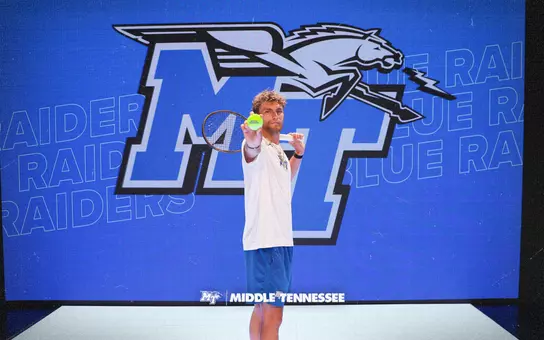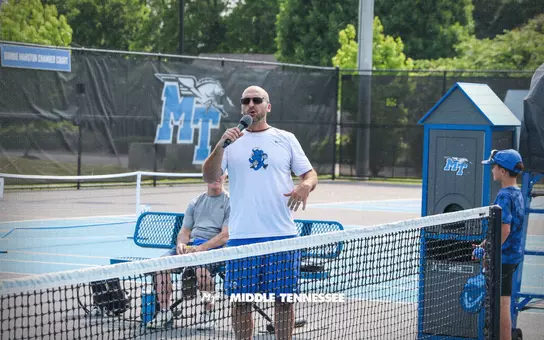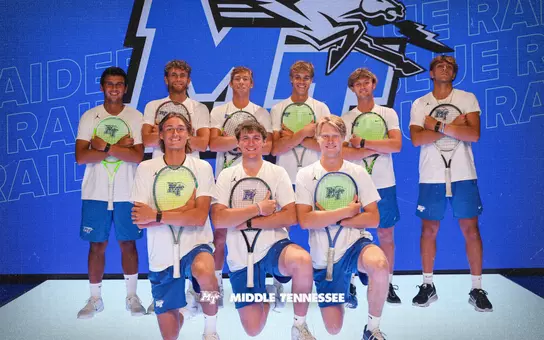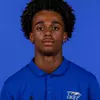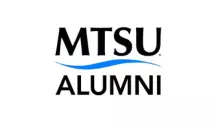Middle Tennessee State University Athletics
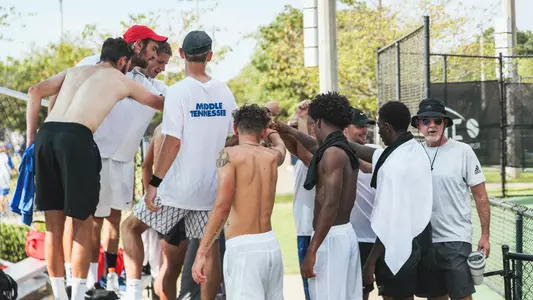
Floyd’s gift continues to impact MTSU athletics and academics in new and different ways, including partnership with Men’s Tennis
10/31/2023 10:00:00 AM | Men's Tennis
MURFREESBORO, Tenn. — In the midst of a pivotal period for the Middle Tennessee men's tennis team, Head Coach Jimmy Borendame has been contemplating building on recent success. With a state-of-the-art facility in development and a team that features new faces, Borendame couldn't help but reflect on the impact of past player's contributions to the team and the program. The significance of the word "team" and the lessons ingrained in him since his days as an athlete have been central to his approach.
Recognizing the need for guidance in shaping his upcoming team, Borendame turned to his colleague, Dr. Colby Jubenville, Director of the Center for Student Coaching and Success. Their partnership in 2018 resulted in the successful placement of Tom Moonen as the team captain and identified Moonen and Max Rauch and as leaders, marking the first step towards one of the most remarkable team successes in program history.
"I'll never forget it, we had lunch at Blue Coast Burrito that day," Borendame said. "Jubenville told me that day 'Jimmy, I'm a friend, I'm a resource. I can help you. Let's put our heads together and bring the team in and evaluate them to help identify and develop a leader for you.'"
In a similar situation this season, Jubenville listened to Borendame and recommended a book that provides a framework for building better leaders and teams – The Ideal Team Player by Patrick Lencioni. Grounded in the virtues that make up "team players," Jubenville recommended not only teaching the content to the team but measuring these virtues within each player. This was an "a-ha" moment for Borendame.
"I talk with Dr. Jubenville every day," Borendame said. "Every team being humble, hungry and smart is a little different. Working with him and hearing how the players identify those characteristics, he does such a good job of pulling it out of the team. They own it. He's such a great speaker and every time I get to talk with him, I always am learning something new about leadership, myself and something I can share with the team. It's almost like having my own leadership coach as a close friend of mine."
An important factor behind the friendship between Borendame and Jubenville is Mr. and Mrs. John and Gina Floyd. The Floyds played a critical role in funding the Center for Student Coaching and Success and have been supporters of the men's tennis program at Middle Tennessee. Without people like John and Gina, the opportunity for Coach Borendame to seek out a resource like Dr. Jubenville and the Harrison Assessment at the Center would not have happened.
"John (Floyd) has been such a great mentor to me and such a great friend to MTSU," Jubenville said. "He believes in the approach I take in developing people. Without his commitment, none of this would be possible. He is one of the most passionate and caring human being on Earth who happens to be also very good at building a business that improves the quality of life for everyone, including me."
At the Center, Jubenville partners with Harrison Assessments, using reports to aid students in self-awareness, understanding narrative, and develop emotional intelligence. Harrison Assessments is capable of measuring 175 individual traits that can be mapped to various frameworks, including The Ideal Team Player.
In this case, Harrison crafted a custom-mapped behavioral competency for each of the Three Virtues found in the Ideal Team Player framework, encompassing hungry (characterized by determination and hard work), humble (defined by a selfless mindset), and smart (notably, emotional intelligence, particularly in interactions with others). This assessment provided Coach Borendame (and his players) with the insights required to identify player's strengths and areas for growth.
"In the realm of tennis, being hungry signifies our relentless pursuit of victory, both on the court and in our personal growth," Borendame said. "Humble means placing the team's success above individual acclaim. Smart translates to emotional intelligence, crucial for navigating interactions with teammates and opponents alike. The Harrison Assessment helped us identify these attributes, allowing us to shape our team around the qualities of being humble, hungry and smart."
"One of the exercises we did was to get student-athletes to line themselves up based on who they believe were humble, hungry and smart," Jubenville said. "We got them to say who they thought would have the highest scores and then we used the Harrison Assessment and showed them how the assessment ranked them. The assessment does the heavy lifting and it shows (the younger players) for the first time that it's not what they say about themselves or what their team says about themselves, it's about what a valid and reliable instrument and their behavior says about themselves. Once they see that, it changes what they see themselves and their role."
While having young players on the squad see what's possible through the team-first culture established by Borendame and his staff, the new faces that the Blue Raiders have added through the transfer portal have slowly started to step up in leadership roles in their own rights.
Going into this year's season, Borendame stressed the importance of building a team. In past years, there's been a focus on individual contributors. Today Borendame is focused on the collective results of the team. That's why looking at humble, hungry and smart was important when looking at this years team.
"We also looked at the level of the growth mindset of the player," Jubenville said. "We asked the question 'Does the man make the moment, or the moment make the man?' In this case, the team had some (veterans) step up and show that they were interested in the collective results, and that's the difference between what we've found this year versus in 2018."
"The only thing I wish I'd done with the fall of 2018 and now is that I wish I would've gotten the guys with Dr. Jubenville earlier in the fall," Borendame said. "Every time I've waited for a leader to appear, that person hasn't emerged. I think in the future, I need to get on this earlier so I can put my finger on their characteristic traits as soon as they get on campus."
Blue Raider fans have become accustomed to winning, and the program is taking the next step to going from not just winning conference titles but making a deep run in the NCAA Tournament and making the Middle Tennessee brand a household name throughout the country. The players recognize that, and it's a huge reason why the program can attract some of the best young players from around the world as well as veterans looking to make an immediate impact in the everyday lineup for the team.
"I hope to get to know my teammates better and what personalities they have," transfer sophomore Karim Al-Amin said. "I want to learn what they can and can't do so we can develop as a team together. I want to learn how our different cultures can help us be our best selves both on and off the court to make us better humans."
"I think the main goal is for the coaches to understand how to teach us and what kind of personalities we have," redshirt-senior transfer Javier Cueto Ramos said. "I think the (assessment) is going to be great to help our team. About 80% of this team is brand new, whether we are transfers or freshman. I think this process will help us find a captain of this team. It's going to help us fill each person's role on this team."
One such finding that was surprising to both the coaching staff and Jubenville is that there is a younger player that stands out and shows traits that point toward leadership. In 2018, Pavel Motl stood out from the assessment as an example of that. Motl, who barely said a word when he first got to Middle Tennessee, left after this past season as one of the best leaders Borendame has had in his tenure at the helm.
This year, one such player that has been identified through the Harrison Assessment to exhibit these qualities as a freshman is Igor Mandou Berranger.
"Since there is a language and cultural barrier in some cases with the players, the Harrison Assessment gives them a connection point that they may not necessarily always have," Jubenville said. "There was one player that stood out, Igor Mandou Barranger, that exhibited the importance of that, even though he's so young."
"Culture is about setting a standard and that standard drives buy-in," Jubenville said. "That buy-in defines the chemistry and the way that athletes connect with each other. For us, the Harrison Assessment becomes part of the standard, and that standard helps drive buy-in to the culture (Coach Borendame) wants for the program, it's the buy-in that helps create a connection."
That's when culture becomes the competitive advantage. The more you are consistent with communicating that in recruiting, the more you are consistent with how relationships are establish, the more you can be consistent with the expectations that you set for your program and all of that drives better results.
In sport, the team takes on the identity of its leader. By using the Harrison Assessment Custom Behavioral Competency mapped to "The Ideal Team Player" framework, the MTSU Tennis Team has been able to identify individuals who possess these virtues and have the desire to utilize them for the benefit of both them and the team. This approach helps connect the virtues of being Hungry, Humble, and Smart, providing groundwork for a cohesive and high-performing unit. With the power of assessment aligned with the Ideal Team Player model, Coach Borendame is poised to assemble a team and embark on a season that mirrors their commitment of the cutting-edge facility in which they will compete.
Recognizing the need for guidance in shaping his upcoming team, Borendame turned to his colleague, Dr. Colby Jubenville, Director of the Center for Student Coaching and Success. Their partnership in 2018 resulted in the successful placement of Tom Moonen as the team captain and identified Moonen and Max Rauch and as leaders, marking the first step towards one of the most remarkable team successes in program history.
"I'll never forget it, we had lunch at Blue Coast Burrito that day," Borendame said. "Jubenville told me that day 'Jimmy, I'm a friend, I'm a resource. I can help you. Let's put our heads together and bring the team in and evaluate them to help identify and develop a leader for you.'"
In a similar situation this season, Jubenville listened to Borendame and recommended a book that provides a framework for building better leaders and teams – The Ideal Team Player by Patrick Lencioni. Grounded in the virtues that make up "team players," Jubenville recommended not only teaching the content to the team but measuring these virtues within each player. This was an "a-ha" moment for Borendame.
"I talk with Dr. Jubenville every day," Borendame said. "Every team being humble, hungry and smart is a little different. Working with him and hearing how the players identify those characteristics, he does such a good job of pulling it out of the team. They own it. He's such a great speaker and every time I get to talk with him, I always am learning something new about leadership, myself and something I can share with the team. It's almost like having my own leadership coach as a close friend of mine."
An important factor behind the friendship between Borendame and Jubenville is Mr. and Mrs. John and Gina Floyd. The Floyds played a critical role in funding the Center for Student Coaching and Success and have been supporters of the men's tennis program at Middle Tennessee. Without people like John and Gina, the opportunity for Coach Borendame to seek out a resource like Dr. Jubenville and the Harrison Assessment at the Center would not have happened.
"John (Floyd) has been such a great mentor to me and such a great friend to MTSU," Jubenville said. "He believes in the approach I take in developing people. Without his commitment, none of this would be possible. He is one of the most passionate and caring human being on Earth who happens to be also very good at building a business that improves the quality of life for everyone, including me."
At the Center, Jubenville partners with Harrison Assessments, using reports to aid students in self-awareness, understanding narrative, and develop emotional intelligence. Harrison Assessments is capable of measuring 175 individual traits that can be mapped to various frameworks, including The Ideal Team Player.
In this case, Harrison crafted a custom-mapped behavioral competency for each of the Three Virtues found in the Ideal Team Player framework, encompassing hungry (characterized by determination and hard work), humble (defined by a selfless mindset), and smart (notably, emotional intelligence, particularly in interactions with others). This assessment provided Coach Borendame (and his players) with the insights required to identify player's strengths and areas for growth.
"In the realm of tennis, being hungry signifies our relentless pursuit of victory, both on the court and in our personal growth," Borendame said. "Humble means placing the team's success above individual acclaim. Smart translates to emotional intelligence, crucial for navigating interactions with teammates and opponents alike. The Harrison Assessment helped us identify these attributes, allowing us to shape our team around the qualities of being humble, hungry and smart."
"One of the exercises we did was to get student-athletes to line themselves up based on who they believe were humble, hungry and smart," Jubenville said. "We got them to say who they thought would have the highest scores and then we used the Harrison Assessment and showed them how the assessment ranked them. The assessment does the heavy lifting and it shows (the younger players) for the first time that it's not what they say about themselves or what their team says about themselves, it's about what a valid and reliable instrument and their behavior says about themselves. Once they see that, it changes what they see themselves and their role."
While having young players on the squad see what's possible through the team-first culture established by Borendame and his staff, the new faces that the Blue Raiders have added through the transfer portal have slowly started to step up in leadership roles in their own right
Going into this year's season, Borendame stressed the importance of building a team. In past years, there's been a focus on individual contributors. Today Borendame is focused on the collective results of the team. That's why looking at humble, hungry and smart was important when looking at this years team.
"We also looked at the level of the growth mindset of the player," Jubenville said. "We asked the question 'Does the man make the moment, or the moment make the man?' In this case, the team had some (veterans) step up and show that they were interested in the collective results, and that's the difference between what we've found this year versus in 2018."
"The only thing I wish I'd done with the fall of 2018 and now is that I wish I would've gotten the guys with Dr. Jubenville earlier in the fall," Borendame said. "Every time I've waited for a leader to appear, that person hasn't emerged. I think in the future, I need to get on this earlier so I can put my finger on their characteristic traits as soon as they get on campus."
Blue Raider fans have become accustomed to winning, and the program is taking the next step to going from not just winning conference titles but making a deep run in the NCAA Tournament and making the Middle Tennessee brand a household name throughout the country. The players recognize that, and it's a huge reason why the program can attract some of the best young players from around the world as well as veterans looking to make an immediate impact in the everyday lineup for the team.
"I hope to get to know my teammates better and what personalities they have," transfer sophomore Karim Al-Amin said. "I want to learn what they can and can't do so we can develop as a team together. I want to learn how our different cultures can help us be our best selves both on and off the court to make us better humans."
"I think the main goal is for the coaches to understand how to teach us and what kind of personalities we have," redshirt-senior transfer Javier Cueto Ramos said. "I think the (assessment) is going to be great to help our team. About 80% of this team is brand new, whether we are transfers or freshman. I think this process will help us find a captain of this team. It's going to help us fill each person's role on this team."
One such finding that was surprising to both the coaching staff and Jubenville is that there is a younger player that stands out and shows traits that point toward leadership. In 2018, Pavel Motl stood out from the assessment as an example of that. Motl, who barely said a word when he first got to Middle Tennessee, left after this past season as one of the best leaders Borendame has had in his tenure at the helm.
This year, one such player that has been identified through the Harrison Assessment to exhibit these qualities as a freshman is Igor Mandou Berranger.
"Since there is a language and cultural barrier in some cases with the players, the Harrison Assessment gives them a connection point that they may not necessarily always have," Jubenville said. "There was one player that stood out, Igor Mandou Barranger, that exhibited the importance of that, even though he's so young."
"Culture is about setting a standard and that standard drives buy-in," Jubenville said. "That buy-in defines the chemistry and the way that athletes connect with each other. For us, the Harrison Assessment becomes part of the standard, and that standard helps drive buy-in to the culture (Coach Borendame) wants for the program, it's the buy-in that helps create a connection."
That's when culture becomes the competitive advantage. The more you are consistent with communicating that in recruiting, the more you are consistent with how relationships are establish, the more you can be consistent with the expectations that you set for your program and all of that drives better results.
In sport, the team takes on the identity of its leader. By using the Harrison Assessment Custom Behavioral Competency mapped to "The Ideal Team Player" framework, the MTSU Tennis Team has been able to identify individuals who possess these virtues and have the desire to utilize them for the benefit of both them and the team. This approach helps connect the virtues of being Hungry, Humble, and Smart, providing groundwork for a cohesive and high-performing unit. With the power of assessment aligned with the Ideal Team Player model, Coach Borendame is poised to assemble a team and embark on a season that mirrors their commitment of the cutting-edge facility in which they will compete.
Players Mentioned
MTSU Tennis Pro-Am 9/6/25
Tuesday, September 09
Facility tour – Stephen and Denise Smith Student-Athlete Performance Center
Wednesday, July 30
Men's Tennis NCAA Selection Show Watch Party on 04/28/25
Tuesday, April 29
MTSU Men's Tennis CUSA Championship vs Liberty Recap on 04/20/25
Wednesday, April 23
